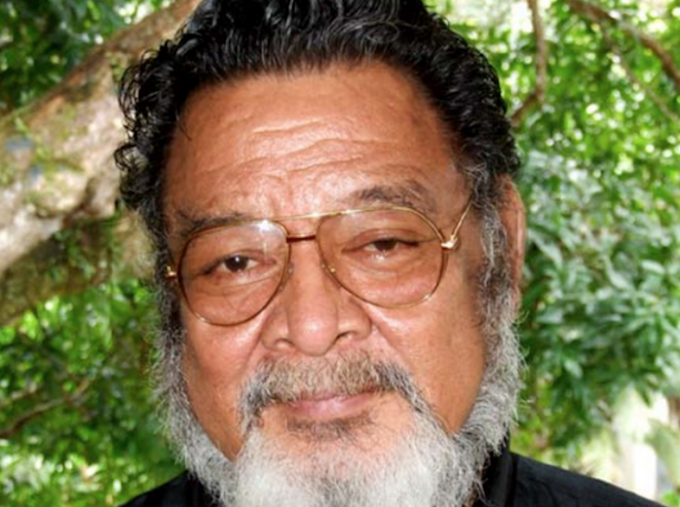
By Philip Cass
The University of Auckland is to bestow a posthumous honorary doctorate on the late Tongan academic, author and sociologist Professor ‘Epeli Hau’ofa.
Hau’ofa was described at the time of his death by The Sydney Morning Herald as an “inspirational writer, satirist and scholar . . . . truly a man of the Pacific, one of the region’s leading writers who promoted a positive vision of Oceanian culture and history”.
Tongan academic Dr Melanaite Taumoefolau said the university would honour Professor Hau’ofa at a graduation ceremony at the Fale Pasifika on Saturday, October 14.
The ceremony will be held from 10am to midday followed by lunch.
Dr Taumoefolau said there would be a small kava circle with Dr Malakai Koloamatangi and Professor ‘Okusi Māhina and a few others.
It is expected there will be about 100-150 guests, mostly Tongan academics and family from the community.
The ceremony will begin with a prayer, followed by speakers who are expected to include Tongan poet and academic Konai Thaman and Sione Tu’itahi.
This will be followed by foaki e mata’itohí, then entertainment from the TAUA Tongan students Association. Sione Tu’itahi will be MC.
‘Extraordinary vision’
Hauʻofa was born in Papua New Guinea to Tongan missionary parents. He went to school in PNG, Tonga and Fiji and then attended the University of New England and the Australian National University (ANU) in Australia and McGill University in Canada.
He graduated from the ANU with a PhD in social anthropology.
He taught at the University of Papua New Guinea and was a research fellow at the University of the South Pacific in Suva, Fiji. From 1978 to 1981 he was keeper of the palace records in his role as Deputy Private Secretary to King Tupou IV.
While in Tonga, he and his wife Barbara edited the literary magazine Faikava. He became the first director of USP’s Rural Development Centre, based in Tonga, in 1981.
He taught sociology at USP in Suva, eventually becoming head of the Department of Sociology.
In 1997, Hauʻofa founded the university’s Oceania Centre for Arts and Culture. Through the centre he was mentor to a new generation of artists, sculptors, dancers and musicians at the USP in Suva.
Hau’ofa was a noted writer. His books included Mekeo: Inequality and Ambivalence in a Village Society, based on his PhD thesis, a novel, Kisses in the Nederends and probably his best known work, Tales of the Tikongs, a lively satire of contemporary South Pacific life, featuring multinational experts, religious fanatics, con men, villagers and corrupt politicians.
Hauʻofa died in Suva on 11 January 2009. At the time of his death, an academic colleague said: “His vision and person were extraordinary.”
Dr Philip Cass writes for Kaniva Tonga and is editor of Pacific Journalism Review. Republished with permission.












































My favourite literary food is Epeli Hau’ofa’s collection of life works, such as ‘We are the Ocean.’ I admire his work, spirit and worldview very much. He was born and lived in PNG for a long time, and I have noticed that he tried to address some internal racism between Mela, Pola, and Micro blackfellas.
Among others like him, Professor ‘Ilaisa Futa ‘i Ha’angana Helu (Tonga), Jean Marie Tjibaou (Kanak), Bernard Narakobi (PNG), Merata Mita (New Zealand), Linda Smith (New Zealand), Konai Helu Thaman (Tonga), and others challenged pervasive Western materialistic and scientific paradigms through their work. These are our ancestors, prophets and thinkers who connect the world we have lost (or are losing) to the strange colonized world we now face.
It would be great if the governments in Oceania turned all of their writing into a curriculum for kindergarten, primary, and high school. In fact, Epeli prefers the term Oceania rather than the Pacific.
As soon as children reach high school and university, it is too late; their worldview has already been reprogrammed. Therefore, we need to start with children’s books. Of course, we should not accept everything they say as gospel truth, but we should read and study their works critically, just as Western children study Homer, Plato, Socrates, Pythagoras, Aristotle, Copernicus, Thomas Aquinas, Shakespeare, Galileo, Newton, David Hume, Hobbes, Descartes, Bacon and so on………
Comments are closed.